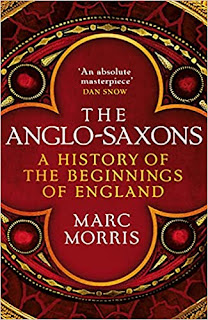I Read Books: The Anglo-Saxons
The Anglo-Saxons
The book is upfront about the problems inherent in a history of Anglos-Saxon England; this is a period of six hundred years, with changing culture, building, trade, farming, politics, religion and relationships with the rest of the world as much as any other six hundred year period you might choose to pick. The first half is very poorly recorded, and if the second half is better, that’s in contrast to what is mostly-no-longer-called the Dark Ages.
This is popular history though and skating over the surface is not only the sine qua non, it’s one of the virtues of the genre. I live in this country and there’s a tendency to talk about history as: the Romans, Roman Britain [mumble] William the Conqueror and the Norman Conquest! In part because that event was so enormous, the change in the ruling class and hence the histories, and in part because of the great stone building projects of the Anglo-Normans eclipsing everything before. So this book, with all its limitations, is very welcome.
Each chapter covers a period of 50-100 years, often based more or less on the life of a prominent figure. This covers the changes from the last chapter, notable events, and the material facts that have been discovered and what, if anything, we can draw as a conclusion. In brief, sometimes the country was a riot of war, rebellion, disaster and religious dispute. Sometimes it was rich, calm and at peace. From 800 CE onwards the main concern was Vikings*, leading to the conquest of the country by Danes led by Cnut The Great.
There were some interesting details and connections for the periods I had some knowledge of, and useful overviews for ones I was more ignorant about. (Useful in this case being for fiction purposes). The regular travels to Rome for princes and kings and also to have Archbishops ordained, as well as continuing connections with Carolingian France put into perspective the place of England in Europe of the late 1st millennium.
Read This: To learn about England between circa 400 and 1066
CE
Don’t Read This: For anything other than an overview of a
long, complex period
* A profession, or calling, rather than a nationality, this is the name for Scandinavians who set sail abroad to look for fortune and glory. Initially, and ever-popularly throughout the age, as raiders, but also as traders, mercenaries and conquerors.


Comments